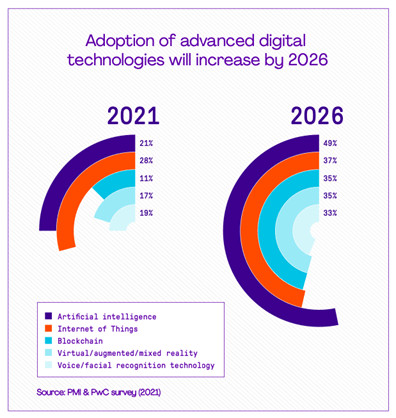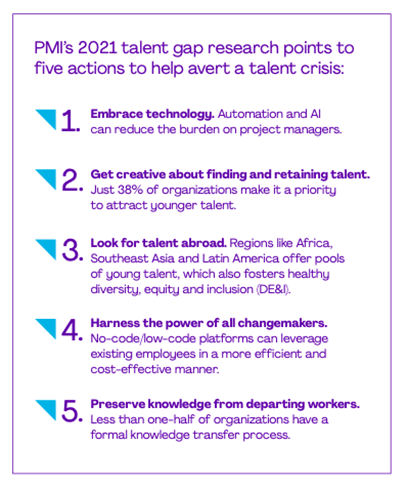PMI have released their Global Megatrends 2022 report, which as well as revealing noteworthy upcoming trends, delves into some greatly insightful study findings and data. The report is well worth a read, and whilst it’s generally directed at project managers, much of the report bears relevance for IT professionals. The findings we’ve picked out below are merely snippets of interest from the studies, along with our own perspective on each megatrend.
Transformation has become business as usual
Digital disruption has been noted as the first of the PMI report’s megatrends. Whilst disruptive tech is nothing new, we are seeing many organisations redefining their core business models and deploying new technologies, and with so much to offer businesses, mass adoption of digital is set to long continue!
“Technologies like cloud computing, the Internet of Things (IoT) and artificial intelligence (AI) were deployed to enhance the customer experience, boost employee efficiency and improve project outcomes.”

The PMI report shows that in as little as the next four to five years the adoption of advanced digital technologies is set to increase. Artificial intelligence alone is looking to jump from 21% to 49% – that is essentially half of the companies surveyed saying they are looking to significantly increase their use of AI in the near future. This will include AI technologies which augment skills such as risk management, data analysis and even decision making.
Handling transformation and its challenges
Successful adoption will require companies to make investments in training, take on IT and data specialists and create a clear strategy for data governance. IT professionals will need more than just technical skills to meet these challenges. They will need to up their leadership skills, adopt an innovative mindset, and have the right process skills in their toolkit. Professional development training can help with this. An accredited qualification such as ITIL® 4 can provide IT managers with a methodology and framework for continual improvement and a strategic mindset for transformation.
“The topic of data ethics is further explored in this report, along with cybersecurity and its implications in the modern workplace. Both areas must be approached with heightened awareness and diligence if we are to transition into a reliable future built on digital progress.”
Transformation is not without its hurdles. New tech presents risks such as data breaches and loss of privacy, as well as resistance to change from staff and stakeholders. But if companies can overcome these obstacles, they shoot to gain a competitive advantage in an increasingly changing marketplace.
Development of capabilities and closing the talent gap
IT professionals must innovate to create a new and better reality in a world where transformation is becoming a constant. Organisations must help individuals to achieve their potential, and recognise that in order to transform their business successfully, they must assist in the evolution of their employees. Failure to do so could spell disaster for the future.
Labour shortages
Whilst the Great Resignation has swept across industries and workforces over the last 12 months, the demand for IT and project professionals has been largely unaffected, and has remained high throughout. A previous report, the PMI’s ‘2021 Talent Gap’, forecasted employment trends for the next decade, and predicted that the global economy needs 25 million new project professionals by 2030! The need for IT specialisms is likely similar as the tech industry continues to develop at a rapid pace.
“How organisations react will determine whether this is a long-term trend or just a reset.”
The Global Megatrends 2022 report cited labour shortages as an emerging trend. The threat of labour shortages looms large, and so organisations must take action in order to develop the next generation of workforce, close the talent gap and essentially future-proof their workers. To do this, they must look to not only upskill existing staff, but also reset the culture within the company. Businesses must also leverage better employer/employee relationships, and, as a result, improved retention will follow.
Demographic shift
A further trend noted by the report is the emergence of a shift in the demographic of workers. Education and improved understanding of developing technologies is, and will continue to be, paramount to success. Individuals and companies alike must commit to a journey of lifelong learning to get ahead, upskilling and continued learning will be critical to both older and younger people, as well as society.
“Although many older people are working past retirement age, industries that require a high degree of specialisation are facing a talent crunch as they seek the next generation of workers. Hayama explains that AI and robots are being used to alleviate the shortage of skilled workers. Especially in the area of maintenance of public infrastructure, technologies such as IoT, AI and drones are used for early detection of defects and reduction of repair costs.” - Takeshi Hayama is a technology strategist at NTT DATA Corp. and vice president of the PMI Japan Chapter.
Technology is becoming ever-smarter, and roles need to develop as a result. Our capabilities must shift. We must look to where humans can add value by questioning - what are the limitations of the technology? Perhaps it's within analysis, or decision making? Leadership soft skills will increasingly be of value, as will digital understanding. This shift within the world of work is sure to last for decades to come, and so we must be smart about employee contributions. The PMI’s 2021 Talent Gap research points to five actions to help avert a talent crisis:

Become a changemaker
The pandemic has undoubtedly taught the world the value of being more nimble, and this has influenced many of the ‘megatrends’ noted in PMI’s 2022 report. We have come to appreciate the strength of collaboration, and how by coming together we can tackle urgent challenges. And what is apparent is that when looking to the future, and reimagining a new path forward, we must continue to work across boundaries in order to succeed.
Just as we collaborate with one another, we must also learn to work with technology to achieve the best possible outcomes. We have the power to be changemakers, turn ideas into reality and drive solutions.
“...understanding the trends affecting our world is only the first step to overcoming or embracing them.”


 United Kingdom
United Kingdom
 Australia
Australia
 New Zealand
New Zealand
 United Arab Emirates
United Arab Emirates
 Europe
Europe
 South Africa
South Africa
 India
India
 Germany
Germany
